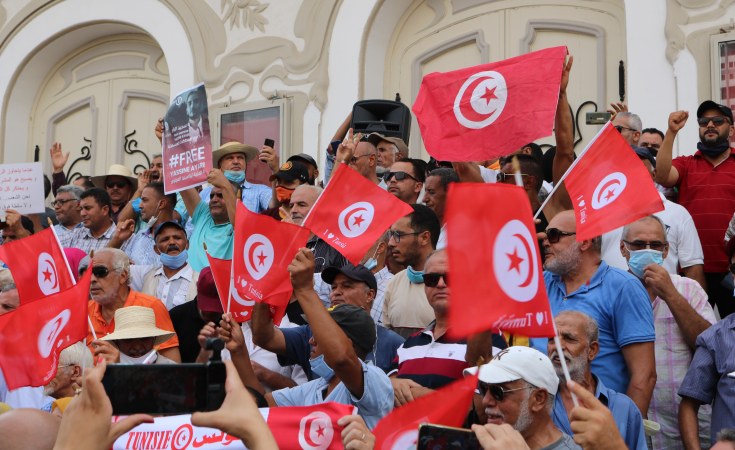Even the head of the constitutional committee warns the document could lead to a "disgraceful dictatorial regime" if passed in the 25 July referendum.
If Tunisians wish to salvage their country's democracy, they must boycott the upcoming 25 July referendum. In that vote, President Kais Saied hopes to pass a new constitution that would replace Tunisia's parliamentary system with a presidential one and give the president sweeping powers to unilaterally pick the head of government, select judges, and extend his own term in office in the case of "imminent danger".
This document has been drafted by Saied alone. He has refused dialogue and even ignored the suggestions of the sham constitutional committee that he himself selected. The head of that body, the former constitutional law professor Sadok Belaid, has said that the draft constitution Tunisians will vote on is "completely different" from what the committee submitted. He has warned that if the draft passes, it could pave the way for a "disgraceful dictatorial regime".
The Tunisian people only have one option - to boycott the 25 July vote and refuse to grant it any legitimacy.
The scenario unfolding today is tragic. For a decade, Tunisia was the standout democratic hope in a region marked by authoritarianism and conflict. Its 2011 uprising sparked the Arab Spring, inspiring neighbouring populations to revolt against decades of political abuse. And after the people overthrew Zine El Abidine Ben Ali, they toiled over long-awaited democratic reforms and institution building.
But these successes are now being dismantled one by one. On 25 July 2021, President Saied responded to protests against the government's handling of the pandemic and economy by declaring a state of emergency, suspending parliament, and dismissing the prime minister. Since then, Tunisians have woken each day to decisions Saied has made unilaterally on their behalf.
For a year now, the president has been consolidating his one-man rule in flagrant disregard for Tunisia's constitutional bodies, political parties, and civil society. In September 2021, he issued a decree that enabled him to choose cabinet members and formulate policy while setting aside segments of the constitution.
In February 2022, he dissolved the Supreme Judicial Council. In April, he seized control of the Electoral Commission as he replaced most of its members. Saied has effectively appointed himself the executive, legislative, and judicial authority of the nation. He has, moreover, imposed arbitrary travel bans on opposition figures and increasing exercised repression of the media.
Alarmingly, Saied's supporters continue to be transfixed by his empty populist slogans about "saving the state", unable to see that their nation is heading towards a full-fledged dictatorship. Meanwhile, many civil society forces have remained silent as the president has ravaged Tunisia's democracy.
The need for stronger civil society
The last year has been a real litmus test to distinguish those who truly believe in democracy and are keen to traverse the long path to achieve it, and those who simply tout empty democratic slogans. Sadly, what this has made clear is that the 11 years since the ouster of Ben Ali has not been sufficient to strengthen Tunisia's civil society, despite ample donor funding. The role of civil society seems to have been mostly confined to workshops, training programmes, and publications.
Tunisia still lacks organised popular movements that can act as a bulwark against attempts to erode democracy. In the face of a state that never believed in its role as a key player in development and reform, civil society has failed to create a new generation of democratic believers ready to fiercely defend the people's rights and freedoms.
In the long-term, Tunisian civil society and its international funders must learn lessons from this and ensure that it prioritises democratic building from the ground up. But in the short-term, national forces need to unite to save the country's democracy.
Tunisia's elected governments of the past decade may have failed to deliver economic stability and left many voters disappointed, but that does not justify throwing away the country's hard fought for separation of powers, its establishment of the Arab world's most progressive constitution, its strengthening of accountability mechanisms, and the independence of its judiciary.
Saied's draft constitution would do just that and more. The first article of the document removes references to Tunisia's very civilian nature. Civil society forces need to wake up and stand up to this assault on their nation. International donors must support the real democrats of Tunisia and not let their gains fall apart. We cannot, and will not, abandon the Arab world's sole democracy.
Mohamed Khallouli is the Executive Director of the Tunisian Youth League.


